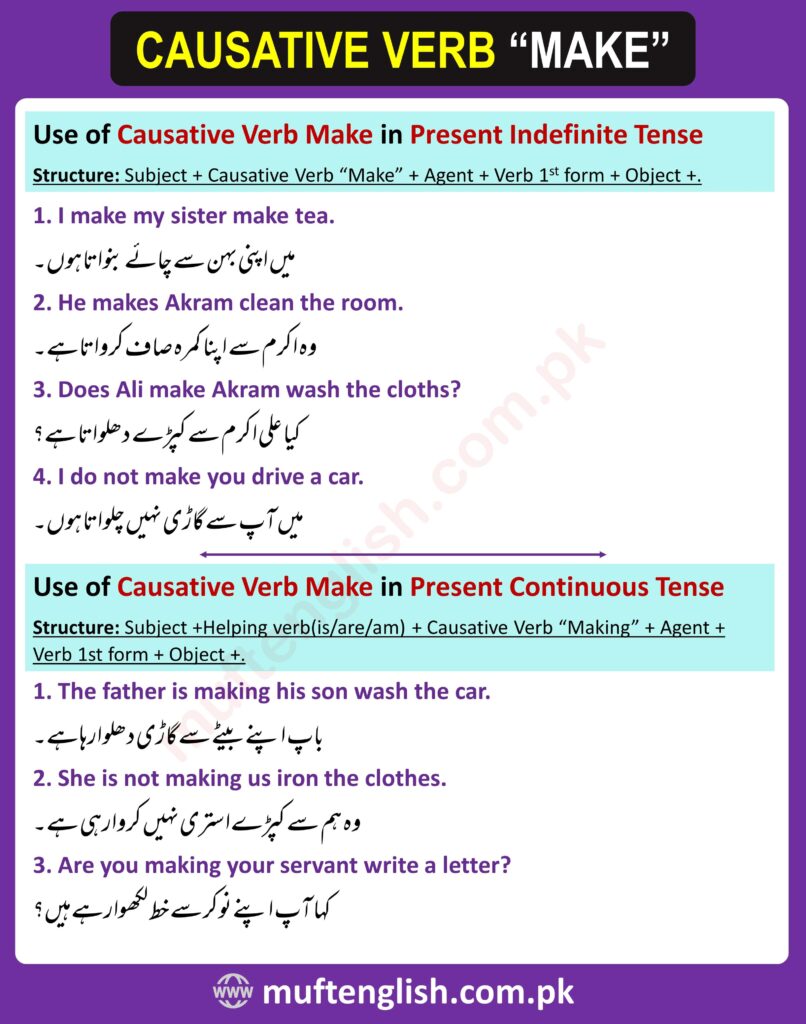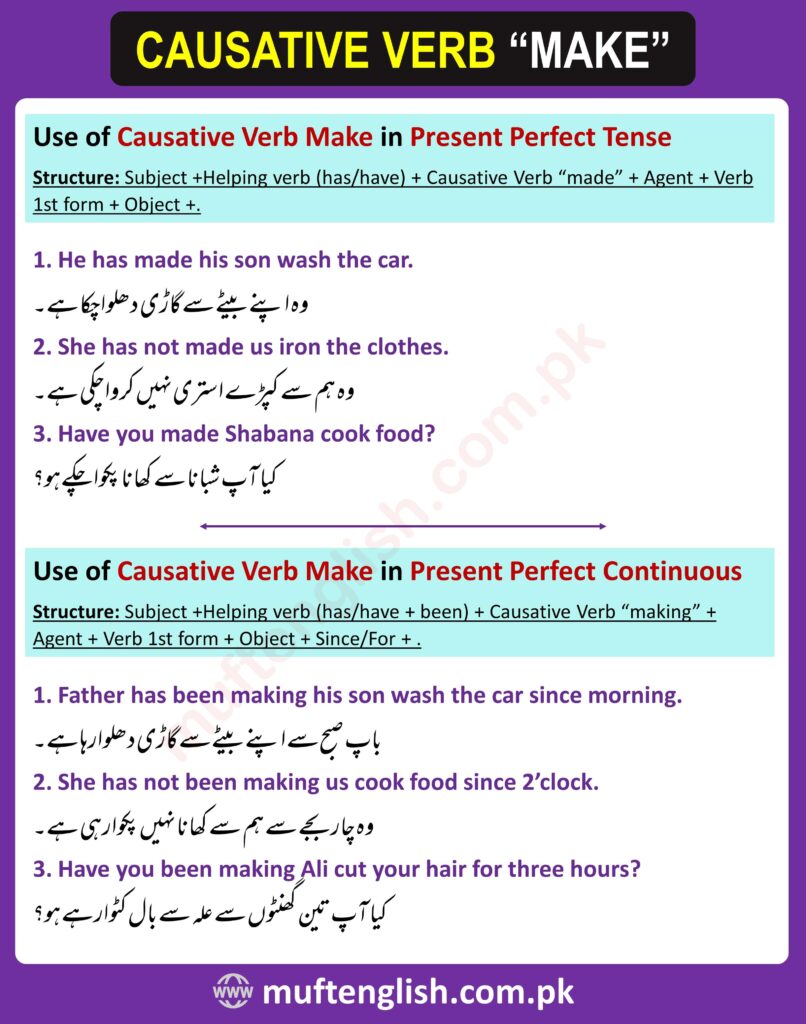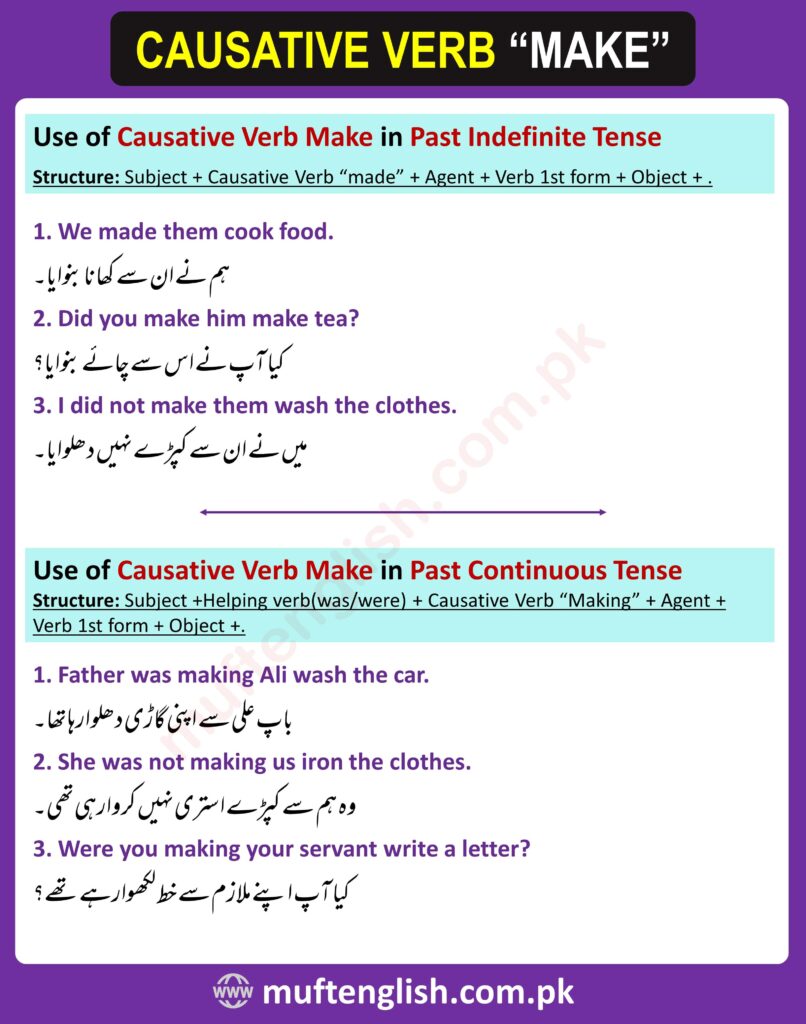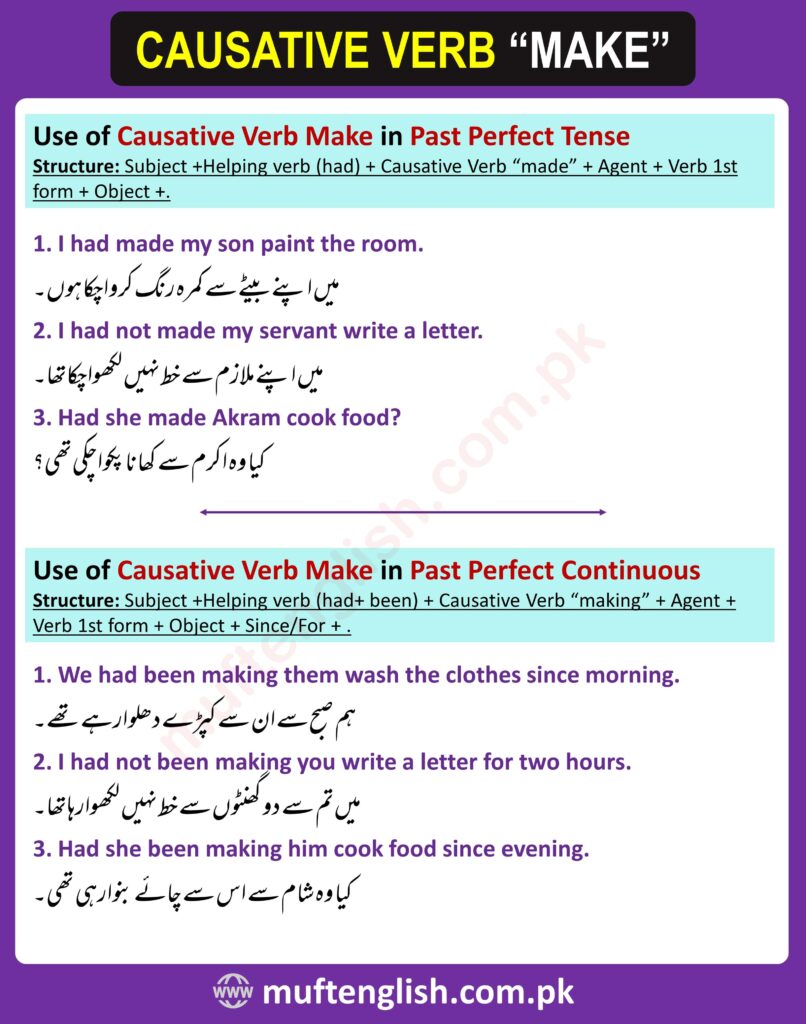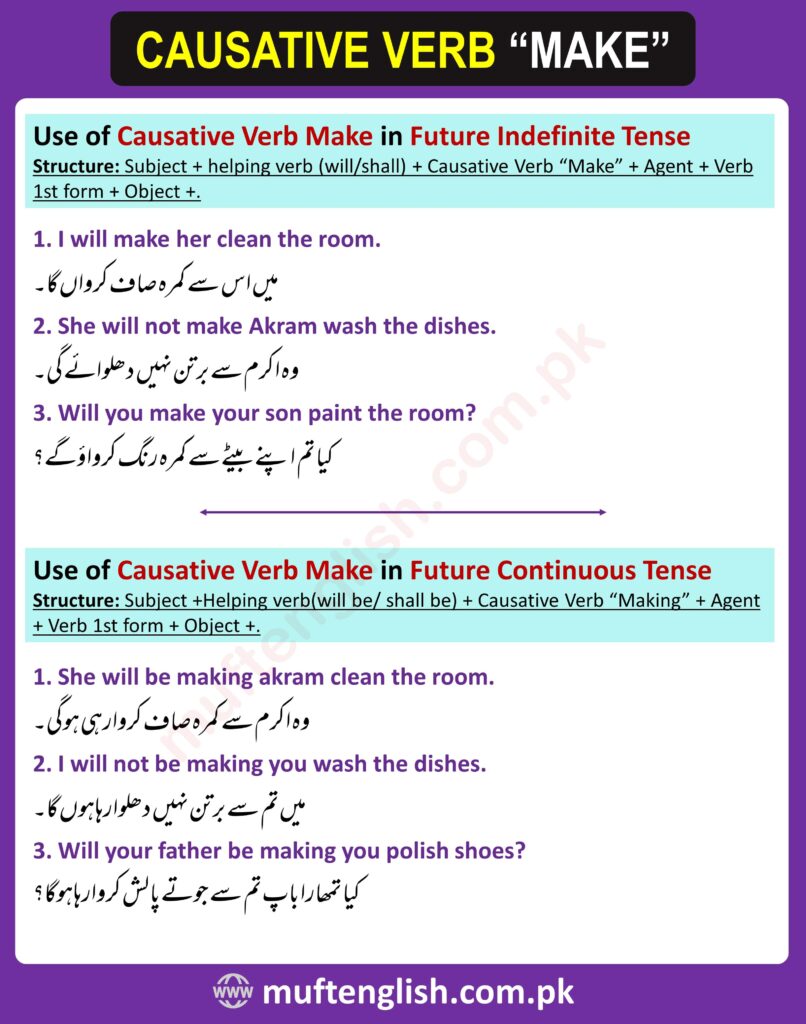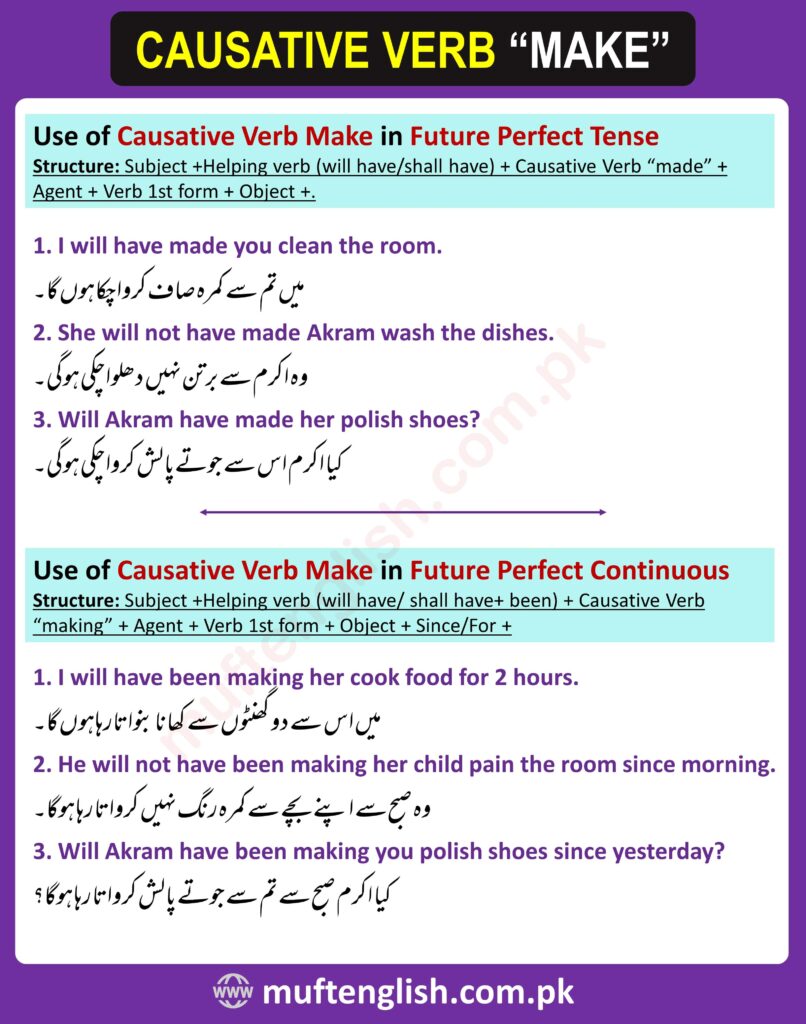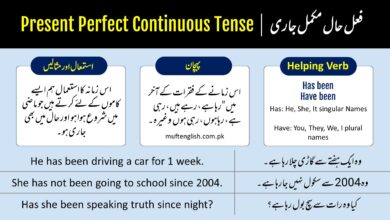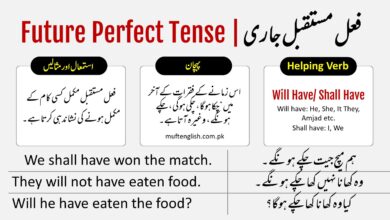Causative Verb MAKE with English and Urdu Examples
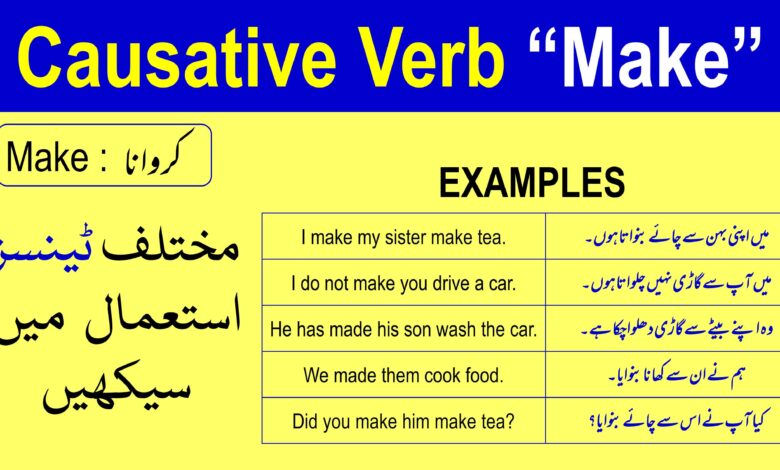
Causative use of Make in Urdu
In this blog, you are going to learn what is a causative verb?, and how to use the causative verb “make” in different tenses with examples in Urdu and English. Learning and understanding the causative verb “make” will help you express that the subject is not doing an action but it is getting the action done by someone else.
What is a Causative Verb?
The causative verbs are the verbs that are used to indicate that one person causes another person to do something. One can cause somebody to do something for him/her paying, requesting, or forcing the person.
وہ فعل جویہ نشاندہی کےلئےاستعمال کیا جاتاکہ ایک شخص دوسرے شخص سے کام کرائے۔ کوئی دوسرے شخص سے ادائیگی درخواست یا زبردستی سےکام کرواسکتا ہے۔ اس میں فاعل برائےراست خود کام نہیں کرتا بلکہ ایجنٹ سے کام کرواتا ہے۔
Make – کروانا
This is used to force or compel someone to do something, and also for general actions.
اس کوکسی سے زبردستی یا مجبورکرکےکچھ کرنے کے لئے استعمال کیا جاتاہے۔ اورعام کام کے لئے بھی استعمال ہوسکتے ہیں۔
Use of Causative Verb MAKE in Present Indefinite Tense
Structure: Subject + Causative Verb “Make” + Agent + Verb 1st form + Object +.
- I make my sister make tea.
میں اپنی بہن سے چائے بنواتا ہوں۔
- He makes Akram clean the room.
وہ اکرم سے اپنا کمرہ صاف کرواتاہے۔
- Does Ali make Akram wash the cloths?
کیا علی اکرم سے کپڑے دھلواتا ہے؟
- I do not make you drive a car.
میں آپ سے گاڑی نہیں چلواتا ہوں۔
You can see in the present indefinite tense we have added (s, es,ies) with causative verbs. This is the rule in the present indefinite tense that we have to add s, es, and ies with the causative verb, not the action verb.
Use of Causative Verb MAKE in Present Continuous Tense
Structure: Subject +Helping verb(is/are/am) + Causative Verb “Making” + Agent + Verb 1st form + Object +.
- The father is making his son wash the car.
باپ اپنے بیٹے سے گاڑی دھلوارہاہے۔
- She is not making us iron the clothes.
وہ ہم سے کپڑےاستری نہیں کروارہی ہے۔
- Are you making your servant write a letter?
کہا آپ اپنے نوکر سے خط لکھوارہےہیں؟
You can notice here that we have added “ing” with the “causative verb make”.
Use of Causative Verb MAKE in Present Perfect Tense
Structure: Subject +Helping verb (has/have) + Causative Verb “made” + Agent + Verb 1st form + Object +.
- He has made his son wash the car.
وہ اپنے بیٹے سے گاڑی دھلواچکا ہے۔
- She has not made us iron the clothes.
وہ ہم سے کپڑے استری نہیں کرواچکی ہے۔
- Have you made Shabana cook food?
کیا آپ شبانا سے کھانا پکواچکےہو؟
In the present perfect tense, we change to make into (made) 3rd form and after the agent, we use 1st form.
Use of Causative Verb MAKE in Present Perfect Continuous Tense
Structure: Subject +Helping verb (has/have + been) + Causative Verb “making” + Agent + Verb 1st form + Object + Since/For + .
- The father has been making his son wash the car since morning.
باپ صبح سے اپنے بیٹےسے گاڑی دھلوارہا ہے۔
- She has not been making us cook food since 2’clock.
وہ چار بجے سے ہم سے کھانا نہیں پکوارہی ہے۔
- Have you been making Ali cut your hair for three hours?
کیا آپ تین گھنٹوں سے علہ سے بال کٹوارہے ہو؟
Use of Causative Verb MAKE in Past Indefinite Tense
Structure: Subject + Causative Verb “made” + Agent + Verb 1st form + Object + .
- We made them cook food.
ہم نے ان سے کھانا بنوایا۔
- Did you make him make tea?
کیا آپ نے اس سے چائے بنوایا؟
- I did not make them wash the clothes.
میں نے ان سے کپڑے نہیں دھلوایا۔
You can see in the above examples we have changed the causative verb make into (made / 2nd form) and in negative and interrogative sentences when “did” came we changed 2nd form into 1st form according to the past indefinite tense.
Use of Causative Verb MAKE in Past Continuous Tense
Structure: Subject +Helping verb(was/were) + Causative Verb “Making” + Agent + Verb 1st form + Object +.
- Father was making Ali wash the car.
باپ علی سے اپنی گاڑی دھلوارہا تھا۔
- She was not making us iron the clothes.
وہ ہم سے کپڑے استری نہیں کروارہی تھی۔
- Were you making your servant write a letter?
کیا آپ اپنے ملازم سے خط لکھوارہے تھے؟
Use of Causative Verb MAKE in Past Perfect Tense
Structure: Subject +Helping verb (had) + Causative Verb “made” + Agent + Verb 1st form + Object +.
- I had made my son paint the room.
میں اپنے بیٹے سے کمرہ رنگ کرواچکا ہوں۔
- I had not made my servant write a letter.
میں اپنے ملازم سے خط نہیں لکھواچکاتھا۔
- Had she made Akram cook food?
کیا وہ اکرم سے کھانا پکواچکی تھی؟
Use of Causative Verb MAKE in Past Perfect Continuous Tense
Structure: Subject +Helping verb (had+ been) + Causative Verb “making” + Agent + Verb 1st form + Object + Since/For + .
- We had been making them wash their clothes since morning.
ہم صبح سے ان سے کپڑے دھلوارہےتھے۔
- I had not been making you write a letter for two hours.
میں تم سے دو گھنٹوں سے خط نہیں لکھوارہا تھا۔
- Had she been making him cook food since evening?
کیا وہ شام سے اس سے چائے بنوارہی تھی۔
Use of Causative Verb MAKE in Future Indefinite Tense
Structure: Subject + helping verb (will/shall) + Causative Verb “Make” + Agent + Verb 1st form + Object +.
- I will make her clean the room.
میں اس سے کمرہ صاف کرواں گا۔
- She will not make Akram wash the dishes.
وہ اکرم سے برتن نہیں دھلوائے گی۔
- Will you make your son paint the room?
کیا تم اپنے بیٹے سے کمرہ رنگ کرواؤگے؟
Use of Causative Verb MAKE in Future Continuous Tense
Structure: Subject +Helping verb(will be/ shall be) + Causative Verb “Making” + Agent + Verb 1st form + Object +.
- She will be making Akram clean the room.
وہ اکرم سے کمرہ صاف کروارہی ہوگی۔
- I will not be making you wash the dishes.
میں تم سے برتن نہیں دھلوارہاہوں گا۔
- Will your father be making you polish shoes?
کیا تمھارا باپ تم سے جوتے پالش کروارہاہوگا؟
Use of Causative Verb MAKE in Future Perfect Tense
Structure: Subject +Helping verb (will have/shall have) + Causative Verb “made” + Agent + Verb 1st form + Object +.
- I will have made you clean the room.
میں تم سے کمرہ صاف کروا چکاہوں گا۔
- She will not have made Akram wash the dishes.
وہ اکرم سے برتن نہیں دھلواچکی ہوگی۔
- Will Akram have made her polish shoes?
کیا اکرم اس سے جوتےپالش کرواچکی ہوگی۔
Use of Causative Verb MAKE in Future Perfect Continuous Tense
Structure: Subject +Helping verb (will have/ shall have+ been) + Causative Verb “making” + Agent + Verb 1st form + Object + Since/For + .
- I will have been making her cook food for 2 hours.
میں اس سے دو گھنٹوں سے کھانا بنواتارہاہوں گا۔
- He will not have been making her child pain the room since morning.
وہ صبح سے اپنے بچے سے کمرہ رنگ نہیں کرواتا رہا ہوگا۔
- Will Akram have been making you polish shoes since yesterday?
کیا اکرم صبح سے تم سے جوتے پالش کرواتا رہا ہوگا؟
Use of MAKE for General Actions
اس کوعام کاموں کے لئے بھی استعمال کیا جاتا ہے۔ جس میں ایجنٹ سے زبردستی کام نہیں کروایا جاتا بلکہ عام کام کروانے کے لئے استعمال کیا جاتا ہے۔جیسا کہ، کسی کو رُلانا، ہنسانا، سمجھانا وغیرہ۔
- She makes me laugh.
وہ مجھے ہنساتی ہے۔
- I made her cry.
میں نے اسےرُلایا۔
- I shall make him understand.
میں اسے سمجھاؤں گا۔
Conclusion:
We have covered almost all the uses of the causative verb “make” in this blog, and we have mentioned many examples with their Urdu translations so that you can easily understand the use of the causative verb “make” in different tenses. Now as you have gone through this blog, and learned the lesson carefully make different sentences and practice each tense using the causative verb “make”.
Causative Verb MAKE with Urdu Examples PDF
You can get the lesson in the PDF below so that you can learn and practice this causative verb later.

